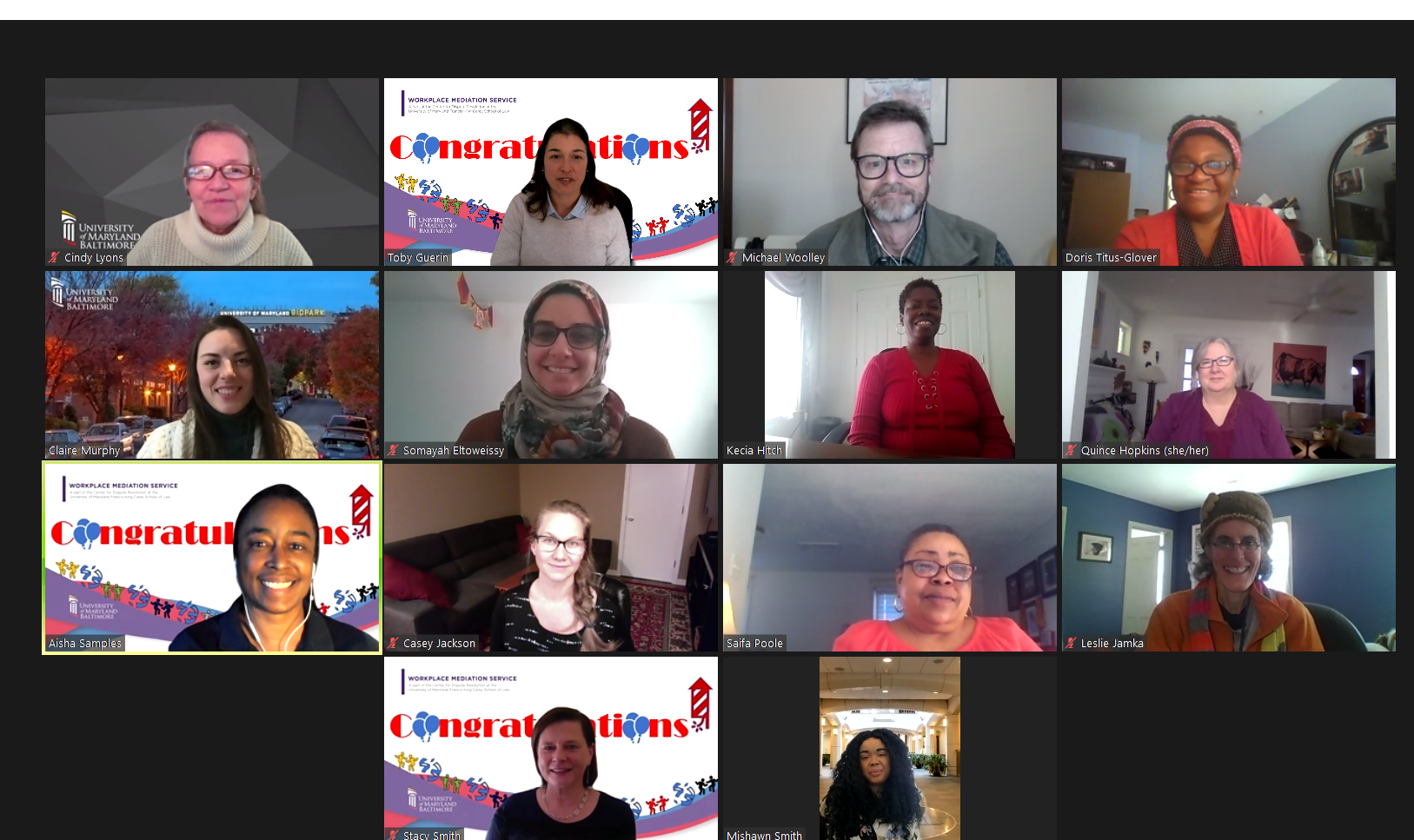UMB’s Workplace Mediation Service Bolsters Roster
December 28, 2020 Jen Badie
Additional mediators from other UMB schools and departments will broaden the program’s diversity in addressing employee conflicts.
You’re a University of Maryland, Baltimore (UMB) employee who is feeling frustrated or overwhelmed about a situation in your workplace. Maybe it’s a problem you’re having with your supervisor over your schedule or a communication issue with a co-worker. Who can you turn to for assistance?
The University’s Workplace Mediation Service (WMS) has been helping employees address those types of difficult situations for more than a year with its program, which is free, voluntary, confidential, and available to all UMB faculty, staff, and student employees. This month, it is tripling its roster of mediators.
WMS, which started in September 2019 with five mediators from the University of Maryland Francis King Carey School of Law’s Center for Dispute Resolution (C-DRUM), began a training session this year to add mediators from across the University. In addition to the law school, the 11 trainees are employees from UMB administration and the schools of nursing, medicine, and social work.
Expanding the roster not only helps get participants to the mediation table faster, it also allows the program to add diversity, in line with one of UMB’s core values.
“I’m looking forward to having greater representation of the diversity of our workplace,” said Toby Treem Guerin, JD, co-director of C-DRUM and a mediator. “You don’t need to be a lawyer or have a master’s in conflict resolution to do this work. You just have to have a commitment to working with people and meeting people where they are.
“I’m excited to support our new mediators, to have them be ambassadors of our program, and to demonstrate that dealing with conflict happens at all levels by all people at the University.”
Moving the Conversation Forward
The role of a mediator is to help the conversation progress so that it meets the needs of the involved employees. Mediation is available for every workplace relationship, including supervisors and direct reports. Mediators remain neutral toward the employees and workplace issues, reflect what has been said, and ask open-ended questions to identify areas of agreement or disagreement.
WMS program specialist Aisha Samples, MS, said reaching an agreement is just one potential outcome.
“One of the great things about the mediation process is that it’s about more than coming to an agreement on things. It’s partly about getting a better understanding of each other and the situation,” she said.
Guerin said the service shows that UMB fosters a workplace that supports its employees.
“The program makes for a better workplace culture and climate,” she said. “And when you’re able to work through your problems and have a more comfortable work environment, you’re more productive. You like what you do. Employee retention increases.”
Mediation Is a ‘Win-Win’
The new mediators, who are receiving more than the 40 hours of training required by the state of Maryland, have met synchronously via videoconference over the last few months and worked on their own to learn conflict resolution methods.
They are being trained to help employees address conflict in a collaborative way, facilitate with impartiality, maintain confidentiality, and follow Maryland mediator confidentiality laws and standards.
Doris Titus-Glover, PhD, RN, an assistant professor with the School of Nursing at the Universities at Shady Grove who is one of the trainees, called the service a “win-win” for UMB.
“You are going to make your employees happy because employees who are unable to vent their feelings or have untenable workplace situations can use the service. UMB benefits by retaining and keeping satisfied employees,” she said. “Bringing supervisors and employees together levels the playing field. It’s a fair situation where nobody’s judging anyone.”
Titus-Glover said she was interested in becoming a mediator because it complemented her background. As a nurse, she must effectively communicate, actively listen, team-build, and problem-solve.
Titus-Glover has found role-playing during the training to be essential.
“Coming from diverse backgrounds is a plus for the program. We learn from each other because we all have different personalities, so I may approach a situation a little bit differently from another mediator,” she said. “We have gained lifelong skills through the formalized mediation training that are applicable in any situation.”
After they have completed the training in December, the trainees will observe the current mediators before they are paired with them to co-mediate.
Determining if Mediation Is Right Step
When an employee contacts WMS, Samples will speak to them during an intake conversation to determine if mediation is the right avenue.
“I ask a lot of open-ended questions, so they have a lot of time to share,” she said. “And we can drill down to what the issues are, what the topics are they might want to discuss in mediation. It’s all about how someone is feeling in the workplace that could help drive them to mediation.”
If the employees decide to proceed, the mediators meet with the participants together, which during the COVID-19 pandemic has moved to videoconference. The pandemic also has led WMS to broaden its services to address conflicts that might arise while many employees are teleworking for an extended period.
“People are extremely stressed, and it’s natural for the stress to carry over into the workplace,” Guerin said. “We’ve been able to expand our services to provide mediation for employees around communication at home, with neighbors, and other issues that can impact the workplace and productivity.”
If an employee is unsure about whether workplace mediation is the right path, they should reach out to WMS, Guerin said.
“We’ll talk through it, explore your options, and if mediation isn’t it, then we have many other resources on campus,” she said.
Contact the Workplace Mediation Service via email at mediation@umaryland.edu or call 410-706-4270. The service is free, voluntary, and confidential. If you are interested in becoming a mediator, contact Aisha Samples at mediation@umaryland.edu to learn about eligibility and future training sessions.